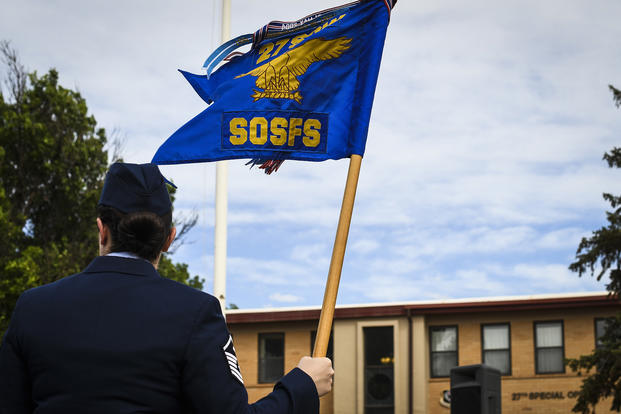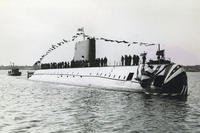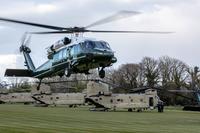A new Air Force study has found what appears to be a higher rate of a rare brain and spinal cord cancer among children of service members stationed at Cannon Air Force Base in New Mexico.
The nearly two-year study examined pediatric brain cancers at the base after concerns about a possible cancer cluster were raised in 2022. The Air Force found three cases of diffuse intrinsic pontine glioma, or DIPG, and the closely related diffuse midline glioma, or DMG -- rare, aggressive and possibly fatal tumors -- among children with parents stationed at Cannon over a 10-year period.
Those cases indicated a higher rate of the disease compared to children of troops at other installations and the general civilian population between 2010 and 2020. However, the service concluded that the study's findings, which were publicly released earlier this month, had a sample size that was too small to draw significant conclusions, according to a press release from the 27th Special Operations Wing.
Read Next: Rare Tribute of Lying in Honor at Capitol Bestowed to Korean War Hero Col. Ralph Puckett
"When conducting these studies, the National Cancer Institute tells us that having 16 or more cases of the same or similarly caused cancers provides more stable statistics and reliable results," Col. Eric Chumbley, chief of the division of aerospace medicine with Air Force Special Operations Command, said in the statement. "In other words, with fewer than 16 cases, the margin of error is too wide."
In September 2022, officials at Cannon's 27th Special Operations Wing were informed of concerns regarding DMG and DIPG cases on base. By January 2023, the Epidemiology Consult Service at the U.S. Air Force School of Aerospace Medicine started studying "if there is a cluster of pediatric cancer at higher rates than the national average," the base said in a press release last year.
Officials said in their findings released this month that there was no data showing a relationship between the cancer cases and environmental conditions at Cannon, including per- and polyfluoroalkyl substances, or PFAS, which are known as "forever chemicals" because they don't break down in the body and have been linked to health concerns.
Most cases of the brain and spinal cord cancers are caused by changes within the body that affect how genes are expressed, officials said in the press release. "This is a random mutation without any known cause," they said.
The research indicated that there was no significant rate of overall pediatric brain cancers within the population but added "when considering only the rare diagnosis of DIPG/DMG, children with a Cannon AFB affiliation had a higher rate of DIPG/DMG compared to the non-Cannon AFB pediatric population and when compared to the U.S. civilian pediatric population," officials said in the press release.
Similar concerns about pediatric brain cancers in the military were brought up six years ago at Florida's Patrick Space Force Base -- then known as Patrick Air Force Base, Military.com previously reported.
Dozens of cases of cancer, and at least eight rare brain-cancer cases, happened on Patrick or in the city of Satellite Beach close by, retired Army helicopter pilot and Air Force veteran James Holmes stated in a 2020 congressional testimony. Holmes lost his daughter, Kaela, in 2019 at age 17 to DIPG.
Col. Jeremy Bergin, the commander of the 27th Special Operations Wing, said in a press release that while the study concluded that the rare cancer rates at Cannon were "likely abnormally high based on chance," it has prompted new plans and policies at the base.
"We will ensure our providers are thoroughly educated on signs and symptoms of pediatric brain cancer; we will actively monitor any cases of pediatric brain cancer and ensure they are referred to the DIPG and DMG international registry; and we will always encourage enrollment of children with these diagnoses into tumor registries and refer them to [a] regional specialist while building knowledge for targeted treatments that could lead to a cure," Bergin said.
The study at Cannon Air Force Base comes amid investigations and studies into larger cancer concerns within the military and the Air Force.
Findings given to the House Armed Services Committee in February 2023 detailed higher cancer rates among pilots and aircrew.
Aircrew had an 87% higher rate of melanoma, 39% higher rate of thyroid cancer, 16% higher rate of prostate cancer and 24% higher rate of cancer for all types, a letter detailing the findings said.
Ground-crew members had a higher incidence of brain and nervous system cancers by 19%, thyroid (by 15%), melanoma (by 9%), kidney and renal pelvis (by 9%), and of all types by 3%, the findings showed.
The findings at Cannon Air Force Base also comes as the Air Force is investigating cancer concerns among America's missileers, nuclear missile maintainers and support staff related to the nation's intercontinental ballistic missile bases.
Last month, the Air Force found some elevated rates of cancer among missileers, maintainers and other job positions responsible for handling ICBMs, according to early and inconclusive results from an ongoing and wide-ranging health study.
"We are seeing in the data that breast and prostate cancers may be trending toward an increased incidence in the missile community, which mirrors some other nationally published data reviewing cancer incidents in the U.S. military more broadly," Charles Hoffman, an Air Force Global Strike Command spokesman, said in a statement.
So far, the initial research has only looked at Defense Department records, which "captures fewer than 25% of total cancer cases" likely to be found by the study, a memo detailing the early results said.
Related: The Air Force Is Investigating Cases of Rare Pediatric Brain Cancers. This Isn't the First Time.












